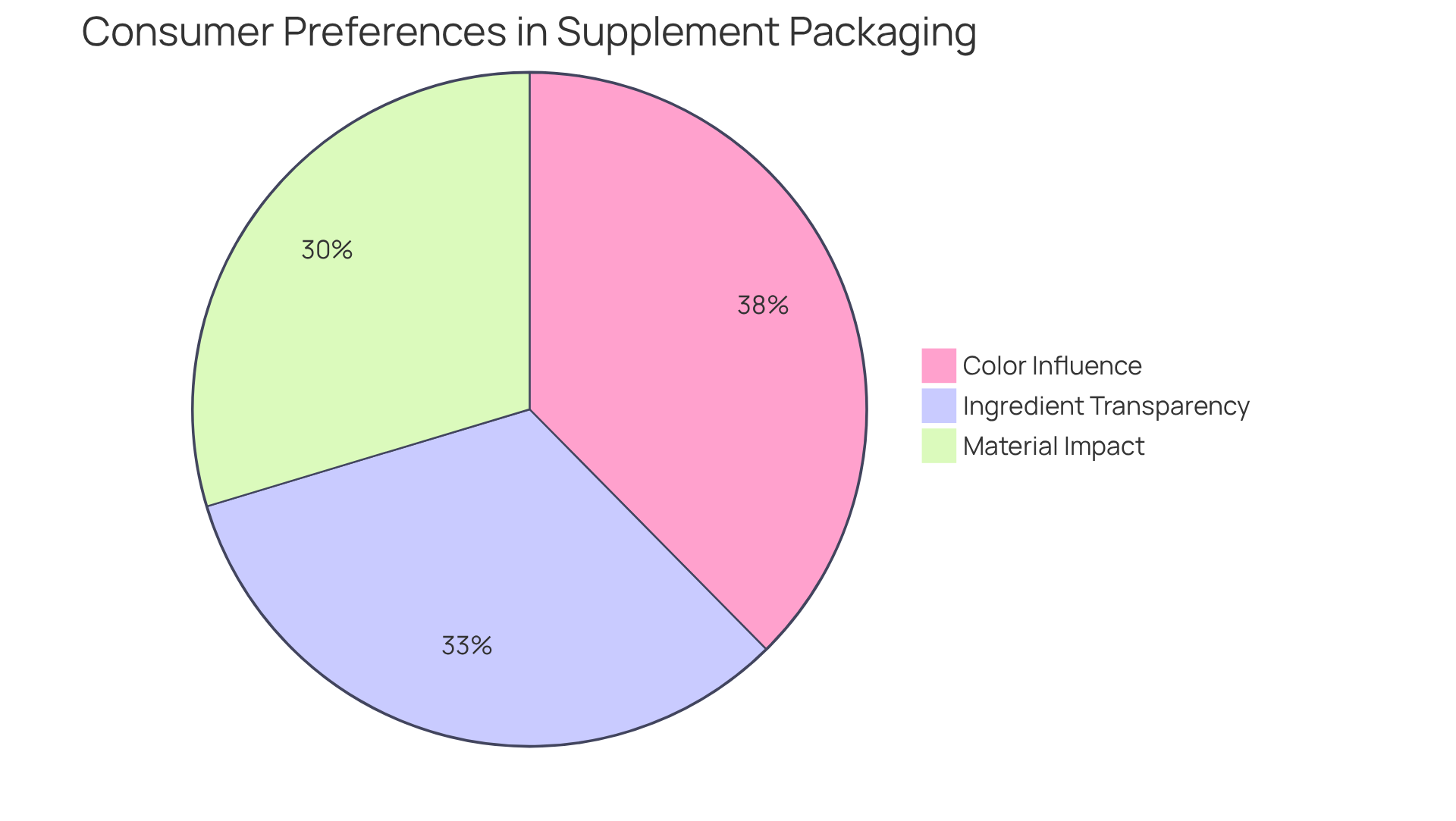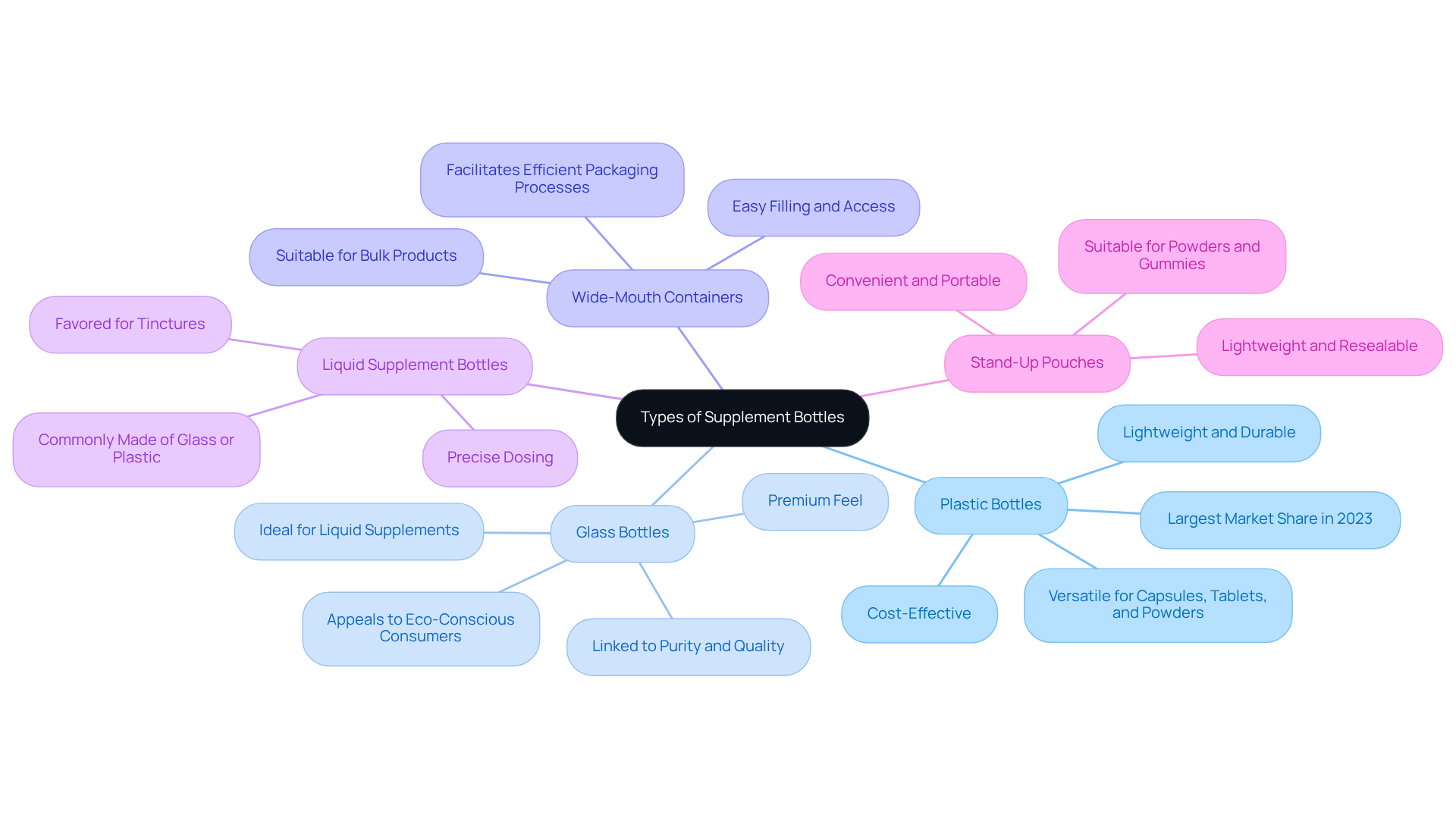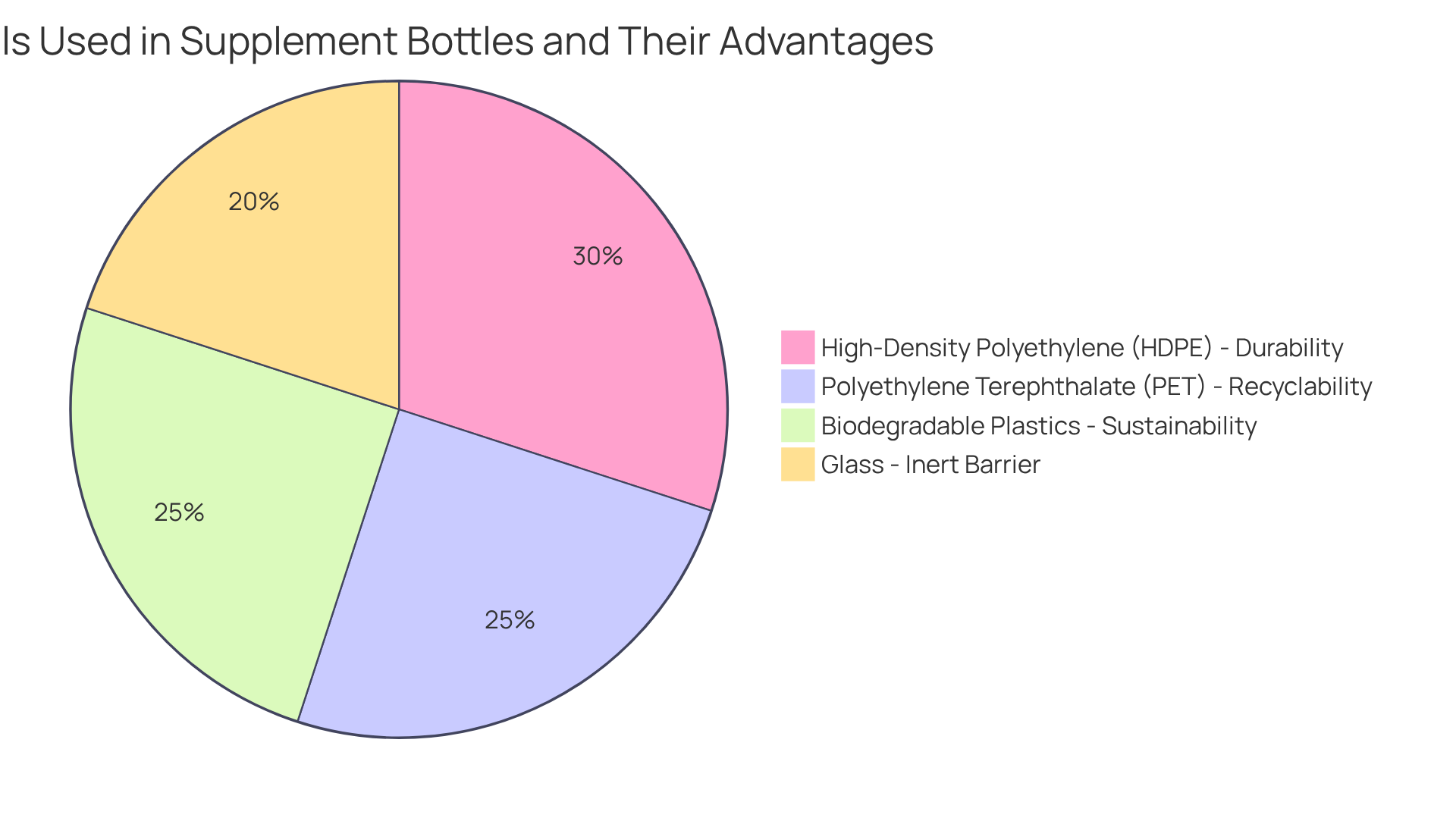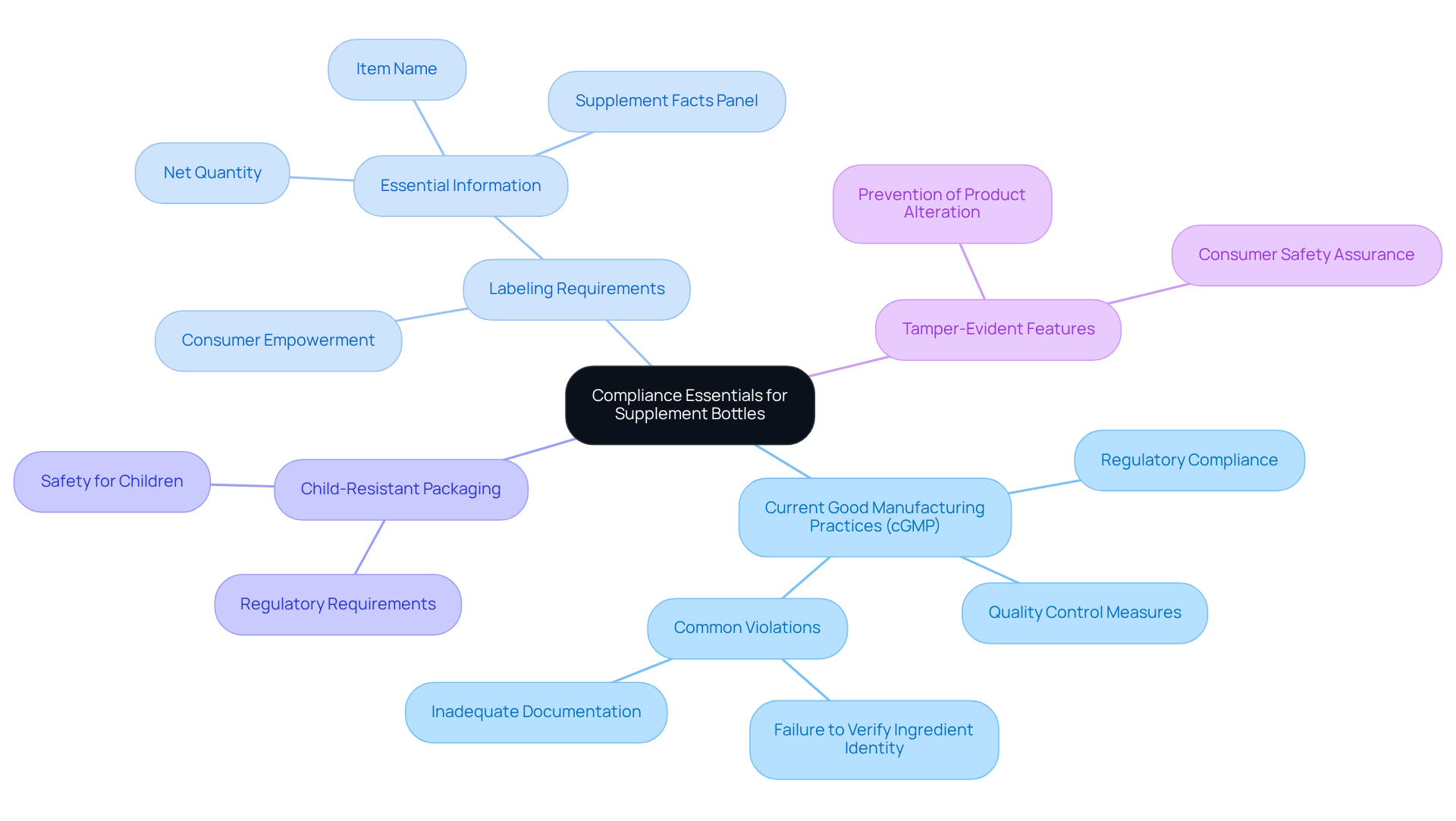Overview
This article offers a comprehensive overview of the various types of supplement bottles, their materials, and the regulations that govern them. It emphasizes the critical role these bottles play in ensuring consumer safety and maintaining product integrity. Supplement bottles are meticulously designed to protect their contents from environmental factors while adhering to stringent safety standards and regulations. This adherence not only safeguards the product but also builds consumer trust, significantly influencing purchasing decisions. Understanding the intricacies of supplement bottle packaging is essential for industry professionals committed to delivering quality solutions that resonate with safety-conscious consumers.
Introduction
Understanding the intricacies of supplement bottles reveals a fascinating intersection of safety, functionality, and consumer appeal. These vessels not only safeguard essential nutrients from environmental threats but also play a pivotal role in shaping brand identity and consumer trust.
As the market evolves, manufacturers face the challenge of balancing sustainability, compliance, and innovative design while meeting consumer expectations. This article delves into the various types of supplement bottles, the materials that comprise them, and the regulatory landscape that governs their production.
It offers insights into the critical factors that influence both safety and market success, underscoring the importance of quality solutions in this dynamic industry.
Define Supplement Bottles: Purpose and Functionality
Supplement bottles are essential vessels specifically engineered to hold dietary supplements, encompassing vitamins, minerals, and herbal products. The primary function of supplement bottles is to protect their contents from environmental factors such as moisture, light, and air, which can undermine the quality and efficacy of the supplements. Advanced packaging technologies are vital for maintaining product integrity throughout its lifecycle, addressing challenges like product stability and regulatory compliance.
These supplement bottles provide practical advantages, ensuring convenient access for users while incorporating safety features such as child-resistant caps and tamper-evident seals. Such design elements transcend mere regulatory requirements; they significantly bolster trust and safety for users. Studies reveal that 74% of consumers prefer brands that transparently disclose their ingredients, underscoring the importance of labeling in cultivating buyer trust.
Moreover, the design and material choices of supplement containers significantly influence branding, impacting buyer perceptions and purchasing decisions. A striking 85% of consumers agree that color greatly affects their product purchasing choices, highlighting the necessity for brands to consider color psychology in their design strategies. Additionally, 67% of surveys indicate that container materials influence buying decisions, emphasizing the importance of material selection in supplement container design. Practical examples, such as the innovative use of plant-derived compostable containers by Heis Global and Terraseed's eco-friendly packaging initiative, illustrate how sustainable packaging options can attract environmentally conscious consumers while enhancing brand image.
In conclusion, the purpose and functionality of supplement bottles extend beyond mere containment; they are integral to user safety, brand identity, and overall market success.

Explore Types of Supplement Bottles: Options and Uses
Supplement bottles are available in various types, each tailored to specific products and consumer preferences. The most common types include:
-
Plastic Bottles: Lightweight and durable, plastic bottles are favored for their cost-effectiveness and versatility. They are commonly used for capsules, tablets, and powders, making them a staple in the nutraceutical industry. The plastic segment captured the largest market share in 2023 due to its adaptability and lightweight properties, which are essential for e-commerce and shipping. Additionally, supplement bottles made of plastic are often favored for their strength-to-weight ratio and clarity, which improves shelf visibility.
-
Glass Bottles: Renowned for their premium feel, supplement bottles made of glass are ideal for liquid supplements and sensitive products that require protection from light and air. They are often utilized for oils and tinctures, appealing to eco-conscious consumers and brands in the premium segment. Supplement bottles made of glass are linked to purity and quality, enhancing brand perception and sustainability.
-
Wide-Mouth Containers: These wide-mouth containers are designed for easy filling and access, making them suitable for bulk products like protein powders and herbal blends. Their design facilitates efficient packaging processes for supplement bottles, which is crucial for manufacturers looking to optimize operations.
-
Liquid Supplement Bottles: Typically used for liquid supplements, these bottles allow for precise dosing and are often made of glass or plastic. This format is especially favored for tinctures, where precise measurement is essential for user safety and satisfaction.
-
Stand-Up Pouches: While not traditional bottles, these flexible packages are gaining traction due to their lightweight design and resealability, making them suitable for powders and gummies. Their convenience corresponds with the rising trend towards adaptable wrapping, which is increasingly preferred by shoppers for its portability and simplicity.
Recent trends indicate a shift towards sustainable solutions, with many manufacturers exploring recyclable materials and biodegradable options for products like supplement bottles. Despite strong demand from buyers for sustainable packaging, the percentage of U.S. dietary supplement manufacturers using such materials, particularly in supplement bottles, remains in the low double digits, emphasizing considerable growth potential in this area.
Industry leaders emphasize the advantages of supplement bottles made of plastic over glass in terms of cost and versatility. For example, plastic bottles are frequently favored for their strength-to-weight ratio and clarity, which improves shelf visibility. In contrast, glass bottles are praised for their capacity to maintain product integrity and attract buyers looking for premium choices. As the nutraceutical market continues to develop, grasping the subtleties of supplement bottles and their materials will be essential for producers striving to satisfy buyer expectations and regulatory standards. Furthermore, innovations like PillSafe Technology's advanced drug distribution system illustrate how packaging technology can enhance medication adherence, reflecting the industry's ongoing commitment to improving consumer safety.

Examine Materials for Supplement Bottles: Safety and Compliance
Supplement bottles are typically constructed from a variety of materials, each offering distinct advantages in safety, compliance, and environmental impact:
-
High-Density Polyethylene (HDPE): Esteemed for its durability and chemical resistance, HDPE stands out as a preferred choice for plastic supplement bottles. It is FDA-approved for food contact, ensuring safety for storing dietary supplements. Its robust nature effectively safeguards items from external contaminants.
-
Polyethylene Terephthalate (PET): This lightweight plastic is frequently utilized for transparent containers, allowing individuals to view the contents within. PET is not only recyclable but also supports sustainability initiatives within the nutraceutical market, appealing to environmentally conscious consumers.
-
Glass: Glass bottles serve as an inert barrier against contaminants, rendering them suitable for delicate items. They are particularly favored for oils and liquid supplements due to their capacity to preserve potency and prevent chemical interactions.
-
Biodegradable Plastics: Emerging as a sustainable alternative, biodegradable plastics are engineered to decompose more readily in the environment. This option attracts environmentally aware consumers seeking to minimize their ecological impact.
Each of these materials must adhere to stringent safety standards to prevent the leaching of harmful substances into the supplements, thereby preserving integrity and ensuring user safety. As the nutraceutical sector evolves, compliance with FDA regulations regarding materials for containers remains crucial for manufacturers aiming to deliver safe and effective products.

Understand Regulations Governing Supplement Bottles: Compliance Essentials
The wrapping of dietary supplements is governed by various regulations designed to ensure consumer safety and maintain item integrity. These regulations are critical for manufacturers aiming to uphold quality standards and protect their consumers. Key regulations include:
- Current Good Manufacturing Practices (cGMP): Established by the FDA, these guidelines require manufacturers to adhere to stringent quality control measures throughout the production and packaging processes.
- Labeling Requirements: The FDA mandates that supplement labels contain essential information, including the item name, net quantity, and a complete Supplement Facts panel. This ensures clarity and empowers individuals to make informed decisions.
- Child-Resistant Packaging: For specific items, particularly those posing potential dangers to children, regulations require child-resistant packaging to prevent accidental ingestion.
- Tamper-Evident Features: To bolster consumer safety, many regulations necessitate that supplement bottles include tamper-evident seals, assuring that the product has not been altered prior to purchase.
Manufacturers must remain vigilant and informed about these regulations to avoid penalties and ensure that their products are both safe and compliant. Staying ahead of regulatory requirements is not just a legal obligation; it is a commitment to quality and consumer trust.

Conclusion
Supplement bottles serve as more than mere containers; they are essential in preserving the quality and efficacy of dietary supplements while ensuring user safety and adherence to regulations. A thorough understanding of the various types, materials, and regulations governing these bottles highlights their critical role in the nutraceutical industry and underscores their influence on consumer trust and brand identity.
This article explores the diverse types of supplement bottles, ranging from durable plastic and premium glass to innovative stand-up pouches, each designed for distinct purposes and consumer preferences. It emphasizes the importance of materials such as HDPE and PET, which guarantee safety and sustainability while complying with stringent regulatory standards. Furthermore, the necessity for compliance with FDA guidelines and the inclusion of safety features—such as child-resistant packaging and tamper-evident seals—reinforces the commitment that manufacturers must uphold to protect consumers.
As the demand for sustainable and safe packaging solutions continues to rise, manufacturers are urged to innovate and adopt environmentally friendly practices. By prioritizing high-quality materials and adhering to regulatory requirements, the industry can enhance consumer confidence and positively impact public health. Ultimately, understanding the complexities of supplement bottles empowers consumers to make informed choices, fostering a marketplace that values safety, transparency, and sustainability.
Frequently Asked Questions
What are supplement bottles?
Supplement bottles are specially designed containers that hold dietary supplements, including vitamins, minerals, and herbal products.
What is the primary function of supplement bottles?
The primary function of supplement bottles is to protect their contents from environmental factors such as moisture, light, and air, which can affect the quality and efficacy of the supplements.
Why are advanced packaging technologies important for supplement bottles?
Advanced packaging technologies are important for maintaining product integrity throughout its lifecycle, addressing challenges like product stability and regulatory compliance.
What safety features do supplement bottles typically include?
Supplement bottles often include safety features such as child-resistant caps and tamper-evident seals to enhance user safety and trust.
How does labeling impact consumer trust in supplement brands?
Labeling is crucial for building consumer trust, as studies show that 74% of consumers prefer brands that transparently disclose their ingredients.
How do design and material choices affect consumer perceptions of supplement bottles?
The design and material of supplement containers significantly influence branding, with 85% of consumers agreeing that color affects their purchasing decisions and 67% indicating that container materials impact their choices.
Can you provide examples of innovative supplement bottle designs?
Examples include Heis Global's use of plant-derived compostable containers and Terraseed's eco-friendly packaging initiative, which attract environmentally conscious consumers and enhance brand image.
What is the overall significance of supplement bottles in the market?
Supplement bottles are integral not only for user safety and product containment but also for brand identity and overall market success.




